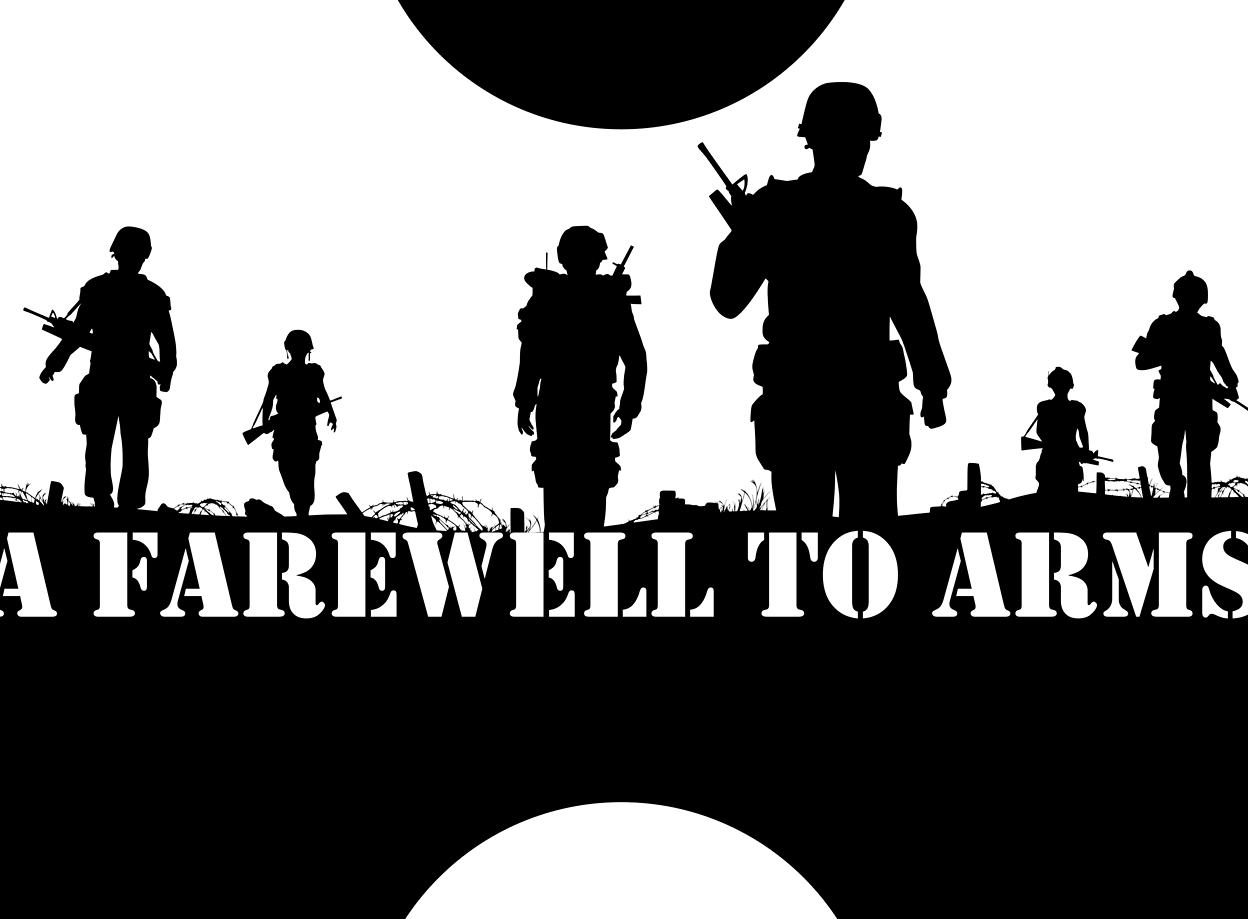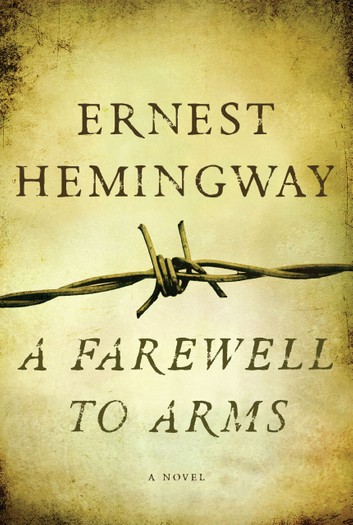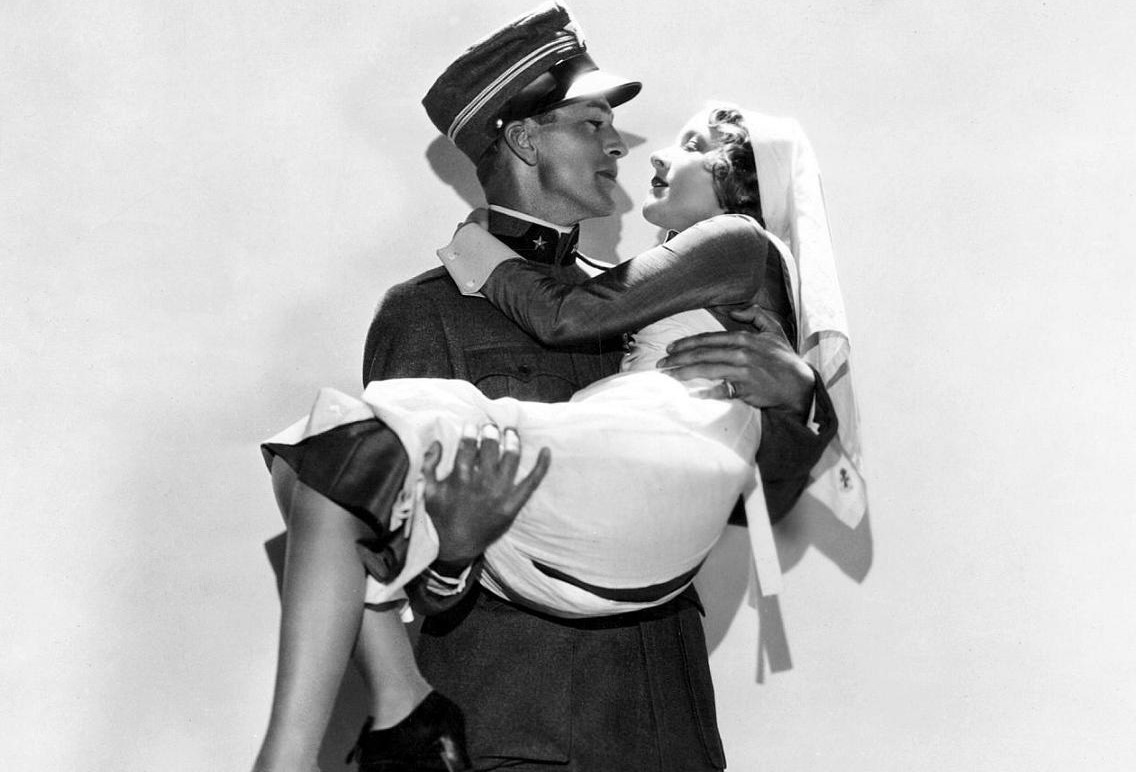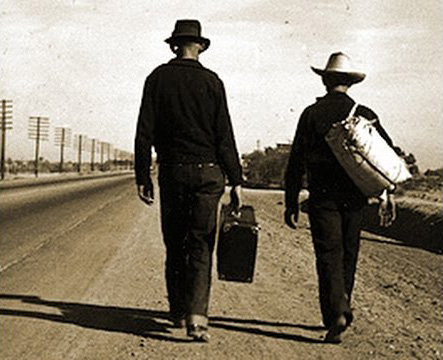1. What was censored from A Farewell to Arms when it was first published (Scribner’s Magazine)?
The novel first appeared in six installments in Scribner’s Magazine between May and October of 1929. Censorship came before it was even published. The editors Robert Bridges and Max Perkins knew that they’d be attacked in the press unless they removed some of the obscene language in the manuscript. They also feared that the advertisers will be offended. Bridges replaced the words shown below in bold with dashes (“—“). The words expurgated from the text were: balls, cocksucker, fuck, Jesus Christ, shit, son of a bitch, whore and whorehound.
Note: This section addresses the first version of censorship. The first 11 quotations below, containing shit, cocksucker and fuck in all its variants, are still censored to this day. Additionally, the crossed-out lines throughout this article indicate those ones removed in sanitation of the text.
Lieutenant Frederic Henry and fellow ambulance drivers are trying to find a safe spot from Austrian soldiers. One of them is concerned:
“They’ll shell the shit out of us.” 1Ernest Hemingway, A Farewell to Arms (New York: Charles Scribner’s Sons, 1929; reprint, New York: Harper Perennial, 2014), 47.
Henry, along with other men, are resting before they continue on their retreat towards the Italian town of Udine. They reflect on how perilous the retreat may be. Their conversation is infused with humor. Piani, an ambulance driver, dreams of sleeping with the queen, while another driver, Bonello, reminds him that that would be treason.
“We may drink shit before Udine,” Piani said.
[…]
“To-morrow maybe we’ll sleep in shit,” Piani said.
“I’ll sleep with the queen,” Bonello said. He looked to see how I took the joke.
“You’ll sleep with shit,” Piani said sleepily.
“That’s treason, Tenete,” Bonello said. “Isn’t that treason?”
“Shut up,” I said. “You get too funny with a little wine.” 2Ibid., 186.
Piani exclaims at some point, as their army is retreating, that their break is over and they’re on the move again:
“Shit,” Piani said. “They’ve started again.”3Ibid., 191.
Early in the story, Henry picks up a fellow American infantryman fighting with the Italians. He’s trying to concoct a scheme to avoid the war. He tells Henry:
“Fuck the war.” 4Ibid., 33.
The retreat is becoming chaotic. Three ambulances proceed together. Aymo is one of the ambulance drivers whose vehicle is stuck in the mud:
“It’s fucked,’ I said. Is there anything you want in the car, Barto?” 5Ibid., 198.
Henry orders two engineering sergeants riding with another ambulance driver, Bonello, to help get the car unstuck. Afraid that the enemy might catch up with them, they refuse. They start walking off. Henry aims his pistol and shoots at one of them. Bonello takes Henry’s pistol to finish off the wounded soldier. Later in the day, in disbelief he says:
“That’s one thing I can always remember. I killed that fuck of a sergeant.” 6Ibid., 200.
Eventually they abandon the stuck car and carry on with the other two. But they also get stuck, so they continue on foot. Bonello fears he’ll get killed by a horse-mounted soldier. (Cavalry units were prevalent only at the beginning of WWI for their mobility. Their use proved outdated in the face of machine guns and barbed wires.)
“I don’t want to be stuck on a lance by any fucking cavalry.” 7Ibid., 200.
The Italian forces are being bombarded by the Austrians (and later they’d find out also the much-feared Germans). Their front has been broken. Hence they have to start the disorderly retreat. They had to evacuate the hospital from the wounded and the equipment. Before they take off on their retreat, they have to rest. Piani, an ambulance driver, says:
“I’m so fucking sleepy.” 8Ibid., 184.
Bartolomeo Aymo, an ambulance driver, is among the retreating Italian forces. He picks up two teenage girls who are terrified about Aymo’s intentions. He assures them in the most crude way possible that there is no reason to be afraid:
“Don’t worry,” he said. “No danger of fucking,” using the vulgar word.
“No place for fucking.” I could see she understood the word and that was all. Her eyes looked at him very scared. She pulled the shawl tight. “Car all full,” Aymo said. “No danger of fucking. No place for fucking.” Every time he said the word the girl stiffened a little. 9Ibid., 190.
Hemingway tried and failed to retain one word in particular: cocksucker. He considered its usage critical to maintain the natural language of soldiers. Perkins wouldn’t even accept Hemingway’s suggestion of using: c—s—r. So only dashes appeared in its place, as with other words on this list.
Henry, Piani, Aymo and Bonello are fleeing the fighting on foot. Aymo gets shot by presumably incompetent Italian soldiers. He dies instantly. Piani cries out in anger:
“The cocksuckers,” he said. 10Ibid., 206.
As Henry is fleeing with others, he comes across Italian military police who were separating officers from soldiers. They are shooting officers dead on the spot for withdrawing from the war. Meanwhile rumors are spreading that German officers are dressed in Italian uniforms. One of the officers becomes suspicious since Henry “speaks Italian with an accent.” Henry hits back:
“So do you, you cocksucker,” I said. 11Ibid., 215.
Early in the novel, after Henry gets injured, he’s being transferred to an American hospital. Inside the elevator of the hospital, he politely asks one of the men carrying him to be gentle in handling him. The man responds in mockery:
“Son of a bitch who isn’t gentle!” 12Ibid., 79.
Henry meets, Ettore, an Italian from San Francisco who’s fighting in the Italian army. The man likes to tell of his own heroic stories, like the one when he was wounded in the arm by a grenade:
“I saw the son of a bitch throw it,” Ettore said. “It knocked me down and I thought I was dead all right but those damn potato mashers haven’t got anything in them. I shot the son of a bitch with my rifle. I always carry a rifle so they can’t tell I’m an officer.”
[…]
“I don’t know why he threw it. I guess he always wanted to throw one. He never saw any real fighting probably. I shot the son of a bitch all right.” 13Ibid., 117-118.
When two sergeants refuse to help dislodging the stuck vehicle in mud and run away, Henry shoots at them. One of them is wounded. Bonello asks Henry for his pistol to finish off the wounded one. He then declares to Henry in pride and disbelief:
“The son of a bitch,” he said. He looked toward the sergeant. “You see me shoot him, Tenente?” 14Ibid., 197.
Henry farewells Ettore, the military “hero” who’s also a braggart, at the end of their brief encounter. Ettore responds with what might be a dig at the main character of the novel. That’s plausible considering that he meets heavy-drinking Henry with his “woman,” Catherine. No wonder Catherine deeply disliked Ettore!
“Well, so long,”I said. “Keep out of trouble, Ettore.”
“Don’t worry about me. I don’t drink and I don’t run around. I’m no boozer and whorehound. I know what’s good for me.” 15Ibid., 119.
Before Henry heads to the front to fight, he and Catherine spend one final night at a hotel. She complains to him:
“I never felt like a whore before,” she said. I went over to the window and pulled the curtain aside and looked out. I had not thought it would be like this.
“You’re not a whore.’ 16Ibid., 148.
The American infantryman fighting on the Italian side makes his feelings clear about the war to Henry twice in the same conversation:
“I say it’s rotten. Jesus Christ, I say it’s rotten.” 17Ibid., 35.
“Jesus Christ, ain’t this a goddam war?” 18Ibid.
Ettore who never stops talking about his stories of bravery and heroism, advises Henry to walk away from the Italian army and join the American one instead. Henry finds it disgusting that the “hero” is not a man of a cause, but a financial motivation to join the higher bidding army. This is how he reacts when he learns how little he will get paid after his promotion in the Italian army:
“Jesus Christ, what I could do with two hundred and fifty dollars. You better get in the American army quick, Fred. See if you can’t get me in.” 19Ibid., 118.
Perkins was so prudish to the point that he wanted a reference to a natural function, that of the usage of a “bedpan,” removed. Hemingway argued against it seeing it as an honest depiction of life at the hospital. Perkins yielded.
After Henry gets injured and hospitalized, a nurse asks him:
“Would you like to use the bedpan?” 20Ibid., 84.
Perkins wanted to remove a homosexual joke from the manuscript but Hemingway refused:
Rinaldi teases Henry when he finds out that the priest is coming to visit, and Henry had made “big preparations.” He jokes that Henry and the priest are having a homosexual relationship. He likens them to Brigata Anacona, a dirty allusion to the Italian military unit’s number which is 69. Then he continues to joke that Henry being such an amazing lover, he must be an Italian on the inside like him.
“Oh, I knew it. Sometimes I think you and he are a little that way. You know.”
“No, you don’t.”
“Yes, I do sometimes. A little that way like the number of the first regiment of the Brigata Ancona.”
“Oh, go to hell.”
He stood up and put on his gloves.
“Oh I love to tease you, baby. With your priest and your English girl, and really you are just like me underneath.”
“No, I’m not”
“Yes, we are. You are really an Italian.” 21Ibid., 65.
However, Hemingway complied and replaced “balls” with “scrotum.” In Chapter 22, the head nurse accuses Henry that his jaundice is self-inflicted to stay in Milan and keep out of war. He responds:
“Miss Van Campen,” I said, “did you ever know a man who tried to disable himself by kicking himself in the balls?
[…]
“I asked you if you had ever known a man who tried to disable himself by kicking himself in the balls.” 22Ibid., 140.
As more installments of the magazine were published, the editors continued to request more changes, infuriating Hemingway. They promised him that once they print the manuscript in a book format, the censored passages will be returned. At least four other passages were eliminated or sanitized:
Rinaldi’s passage about pain during intercourse with virgins (passage eliminated)
Rinaldi’s advice to Frederic which Perkins removed:
“I tell you something about your good women. Your goddesses. There is only one difference between taking a girl who has always been good and a woman. With a girl it is painful. That’s all I know.” He slapped the bed with his glove. “And you never know if the girl will really like it.” 23Ibid., 66.
Henry’s sexual fantasy of Catherine (passage eliminated)
Before he got injured, Frederic fantasizes about being with Catherine in Milan where was has just been transferred. He imagines making love to her in a hotel room:
I wish she were here now. I wished I were in Milan with her. I would like to eat at the Cova and then walk down the Via Manzoni in the hot evening and cross over and turn off along the canal and go to the hotel with Catherine Barkley. Maybe she would. Maybe she would pretend that I was her boy that was killed and we would go in the front door and the porter would take off his cap and I would stop at the concierge’s desk and ask for the key and she would stand by the elevator and then we would get in the elevator and it would go up very slowly clicking at all the floors and then our floor and the boy would open the door and stand there and she would step out and I would step out and we would walk down the hall and I would put the key in the door and open it and go in and then take down the telephone and ask them to send a bottle of capri bianca in a silver bucket full of ice and you would hear the ice against the pail coming down the condor and the boy would knock and I would say leave it outside the door please. Because we would not wear any clothes because it was so hot and the window open and the swallows flying over the roofs of the houses and when it was dark afterward and you went to the window very small bats hunting over the houses and close down over the trees and we would drink the capri and the door locked and it hot and only a sheet and the whole night and we would both love each other all night in the hot night in Milan. That was how it ought to be. I would eat quickly and go and see Catherine Barkley. 24Ibid., 37-38.
Sex scene between Henry and Catherine (passage selectively trimmed)
Note Hemingway’s choice of words to allude to the couple’s having had sex (“the wildness was gone”) and Catherine’s question (“Now do you believe I love you?”)
She came in the room and over to the bed.
“Hello, darling,” she said. She looked fresh and young and very beautiful. I thought I had never seen any one so beautiful. “Hello,” I said. When I saw her I was in love with her. Everything turned over inside of me. She looked toward the door, saw there was no one, then she sat on the side of the bed and leaned over and kissed me. I pulled her down and kissed her and felt her heart beating.
“You sweet,” I said. “Weren’t you wonderful to come here?”
“It wasn’t very hard. It may be hard to stay.”
“You’ve got to stay,” I said. “Oh, you’re wonderful.” I was crazy about her. I could not believe she was really there and held her tight to me. “You mustn’t,” she said. “You’re not well enough.”
“Yes, I am. Come on.”
“No. You’re not strong enough.”
“Yes. I am. Yes. Please.”
“You do love me?”
“I really love you. I’m crazy about you. Come on please.”
“Feel our hearts beating.”
“I don’t care about our hearts. I want you. I’m just mad about you.”
“You really love me?”
“Don’t keep on saying that. Come on. Please. Please, Catherine.”
“All right but only for a minute.”
“All right,” I said. “Shut the door.”
“You can’t. You shouldn’t.”
“Come on. Don’t talk. Please come on.”Catherine sat in a chair by the bed. The door was open into the hall. The wildness was gone and I felt finer than I had ever felt.
She asked, “Now do you believe I love you?”
“Oh, you’re lovely,” I said. “You’ve got to stay. They can’t send you away. I’m crazy in love with you.” 25Ibid., 89-90.
Catherine’s seduction of Henry (passage selectively trimmed)
Catherine here asks Henry whether he slept with whores like other military men do. He lies and denies and she knows it. However, she proceeds to seduce him. Note, she uses the euphemism “stays with a girl” meaning “sleep with a whore.” The standards of the time wouldn’t allow a “moral girl” from referring explicitly to sex with whores.
“When a man stays with a girl when does she say how much it costs?”
“I don’t know.”
“Of course not Does she say she loves him? Tell me that I want to know that.”
“Yes. If he wants her to.”
“Does he say he loves her? Tell me please. It’s important.”
“He does if he wants to.”
“But you never did ? Really ?”
“No.”
“Not really. Tell me the truth?”
“No,” I lied. “You wouldn’t,” she said. “I knew you wouldn’t. Oh, I love you, darling.”
Outside the sun was up over the roofs and I could see the points of the cathedral with the sunlight on them. I was clean inside and outside and waiting for the doctor.
“And that’s it?” Catherine said. “She says just what he wants her to?”
“Not always.”
“But I will. I’ll say just what you wish and I’ll do what you wish and then you will never want any other girls, will you?” She looked at me very happily. “I’ll do what you want and say what you want and then I’ll be a great success, won’t I?”
“Yes.”
“What would you like me to do now that you’re all ready?”
“Come to the bed again.”
“All right. I’ll come.”
“Oh, darling, darling, darling,” I said. “You see,” she said. “I do anything you want.”
“You’re so lovely.”
“I’m afraid I’m not very good at it yet.”
“You’re lovely.”
“I want what you want. There isn’t any me any more. Just what you want.”
“You sweet.”
“I’m good. Aren’t I good? You don’t want any other girls, do you?”
“No.”
“You see? I’m good. I do what you want.” 26Ibid., 101-103.
Despite all of that, the sexual relationship between the main characters and the unwanted pregnancy were considered so salacious(more details below) that the magazine was banned from newsstands by police in Boston. Some readers had sent complaint letters and threatened to cancel their subscriptions.
2. Why Scribner’s Magazine was still banned despite the extensive censorship?
The magazine issues were still banned since there was other material that was found objectionable. Read below.
The main character frequents, as do other military men, brothels which mainly service men at war. One of them even invites a priest to join in:
Later, below in the town, I watched the snow falling, looking out of the window of the bawdy house, the house for officers, where I sat with a friend and two glasses drinking a bottle of Asti, and, looking out at the snow falling slowly and heavily, we knew it was all over for that year. […] My friend saw the priest from our mess going by in the street, walking carefully in the slush, and pounded on the window to attract his attention. The priest looked up. He saw us and smiled. My friend motioned for him to come in. The priest shook his head and went on. 27Ibid., 6.
Snow has started falling. The men know that there’ll be a reprieve from fighting. They start a relaxed conversation on where to go on leave. At the end of the night, the captain suggests:
“Come on,” said the captain. “We go whorehouse before it shuts.” 28Ibid., 9.
When the retreat starts, the ambulance personnel and soldiers evacuate not only the wounded but also some prostitutes from the “soldiers’ whorehouse.”
The rain had stopped and the town was nearly empty. As we came up the street they were loading the girls from the soldiers’ whorehouse into a truck. 29Ibid., 183.
Henry mentions he once contracted gonorrhea from a prostitute. He also wonders if his friend and fellow officer had contracted syphilis.
“What are you thinking about now?”
“Nothing.”
“Yes you were. Tell me.”
“I was wondering whether Rinaldi had the syphilis.”
“Was that all?”
“Yes.”
“Has he the syphilis?”
“I don’t know.”
“I’m glad you haven’t. Did you ever have anything like that?”
“I had gonorrhea.”
“I don’t want to hear about it. Was it very painful,darling?”
“Very.” 30Ibid., 288.
The young celibate priest is constantly teased by solders:
“To-day I see priest with girls.” 31Ibid., 7.
Then in a joking reference to masturbation:
“Priest every night five against one.” 32Ibid.
Bartolomeo Aymo, an ambulance driver, is among the retreating army. He picks up two girls who are shaking with fear about Aymo’s intentions. After he assures them in the most crude way possible that there is “no danger of fucking,” the older girl starts sobbing. (The obscene words of that scene were never printed as mentioned above.) Then Aymo gives them food and asked her to stop crying. As if he learnt nothing, he proceeds to ask yet another crude question:
“Virgin?” he asked the girl next to him. She nodded her head vigorously. “Virgin too ?” he pointed to the sister. Both the girls nodded their heads and the elder said something in dialect.
“That’s all right,” Bartolomeo said. “That’s all right.”
Both the girls seemed cheered. 33Ibid., 190.
A major theme in the novel that would have raised eyebrows at the time is the unplanned pregnancy of Catherine as a result of her affair with Henry:
“What’s the matter, Catherine?”
“Nothing. Nothing’s the matter.”
“Yes there is.”
“No nothing. Really nothing.”
“I know there is. Tell me, darling. You can tell me.”
“It’s nothing.”
“Tell me.”
“I don’t want to. I’m afraid I’ll make you unhappy or worry you.”
“No it won’t.”
“You’re sure? It doesn’t worry me but I’m afraid to worry you.”
“It won’t if it doesn’t worry you.”
“I don’t want to tell.”
“Tell it.’
“Do I have to?”
“Yes.”
“I’m going to have a baby, darling. It’s almost three months along. You’re not worried, are you? Please please don’t. You mustn’t worry.” 34Ibid., 133.
3. What was censored from the American edition of the book format (the one we read today)?
When Perkins edited the manuscript for publishing it in a book form in September 1929, he returned the above expurgated passages. He also returned the following words: Jesus Christ, son of a bitch, whore, and whorehound. He used the word “scrotum” instead of “balls.” Three words could never be added: cocksucker, shit, and fuck in all their variants. In the US edition we have today, these words were replaced with dashes. (Full text of the American edition is here.)
4. What was censored from the British Edition of the book format?
Later in 1929, Jonathan Cape, a London publishing firm, printed their edition. Their censorship was even more conservative than that of American editors. They made some awkward modifications that amount to tampering. Full text of that edition could be viewed here. For some offensive words, the editors retained the dashes of the American book edition. However, they also made several changes. They deleted the following lines (Ch. 27):
‘We may drink shit before Udine,’ Piani said.
[…]
‘To-morrow maybe we’ll sleep in shit,’ Piani said.
‘I’ll sleep with the queen,” Bonello said. He looked to see how I took the joke.
‘You’ll sleep with shit,’ Piani said sleepily.
‘That’s treason, Tenete,” Bonello said. ‘Isn’t that reason?’
‘Shut up,’ I said. ‘You get too funny with a little wine.’ 35Ibid., 203-204.
The word “shit” in “they’ll shell the shit out of us” was replaced:
‘They’ll shell hell out of us.’ 36Ibid., 55.
The word “cocksuckers” was replaced:
‘The bastards,’ he said. 37Ibid., 225.
And again in “So do you, you cocksucker” with…
‘So do you, you bastard,’ I said. 38Ibid., 236.
The word “fucked” was replaced:
‘It is finished.’ 39Ibid., 198.
And in one case, they decided that the dashes (“any — cavalry”) could be eliminated:
‘I don’t want to be stuck on a lance by any cavalry.’ 40Ibid., 200.
Even the word “scrotum” which had replaced the original “balls” was too explicit.
‘Miss Van Campen,” I said, “did you ever know a man who tried to disable himself by kicking himself in the privates?’
[…]
‘I asked you if you had ever known a man who tried to disable himself by kicking himself in the privates.’ 41Ibid., 154.
1. Confusing
Most readers approach the book knowingly that it was controversial and censored. When they encounter dashes, they have to guess whether they’re omissions of offensive words, or intentionally placed by the author. For example: Rinaldi is curious about how far sexually Henry has gone with Catherine, he asks: “Does she—?” The question crosses the line for Henry who interrupts by saying “Rinin, Please shut up if you want to be my friend, shut up.”
Another example is when Henry confronts Rinaldi, a man who’s always in pursuit of women, that he has “that pleasant air of a dog who —” Rinaldi interrupts him: “Stop it.” So dashes that stand for interruptions, among those of deletions, create an unnecessary confusion.
2. Pointless
Removing such words is meaningless because the readers could easily fill them in themselves. Who doesn’t know what is the missing word from “son of a —“?!
3. Unnatural
The deleted words play an important role in establishing the tone of the scenes in which they appear. These words emphasize the brutal reality of men at war, young men who mainly encounter women only at brothels or hospitals and a doomed love affair. When the natural speech of characters is sanitized, the original intent of the author is lost. No wonder Hemingway was furious when the first obscene phrase, “Fuck the war,” was printed as “— the war”!
All censored words should be restored so future readers could read the masterpiece as it was originally written.
The above is one of two articles on A Farewell to Arms. The other article explains why Italian government banned the novel featuring the most offensive passages.
You might also like:

Why Italy banned Hemingway’s novel A Farewell to Arms?
Hemingway’s depiction of Italian defeat at the Battle of Caporetto of WWI was too painful to publish
BOOK: A FAREWELL TO ARMS

Madame Bovary: The scandalous scenes
Why Gustave Flaubert was put on trial for Madame Bovary?
BOOK: MADAME BOVARY
Endnotes






